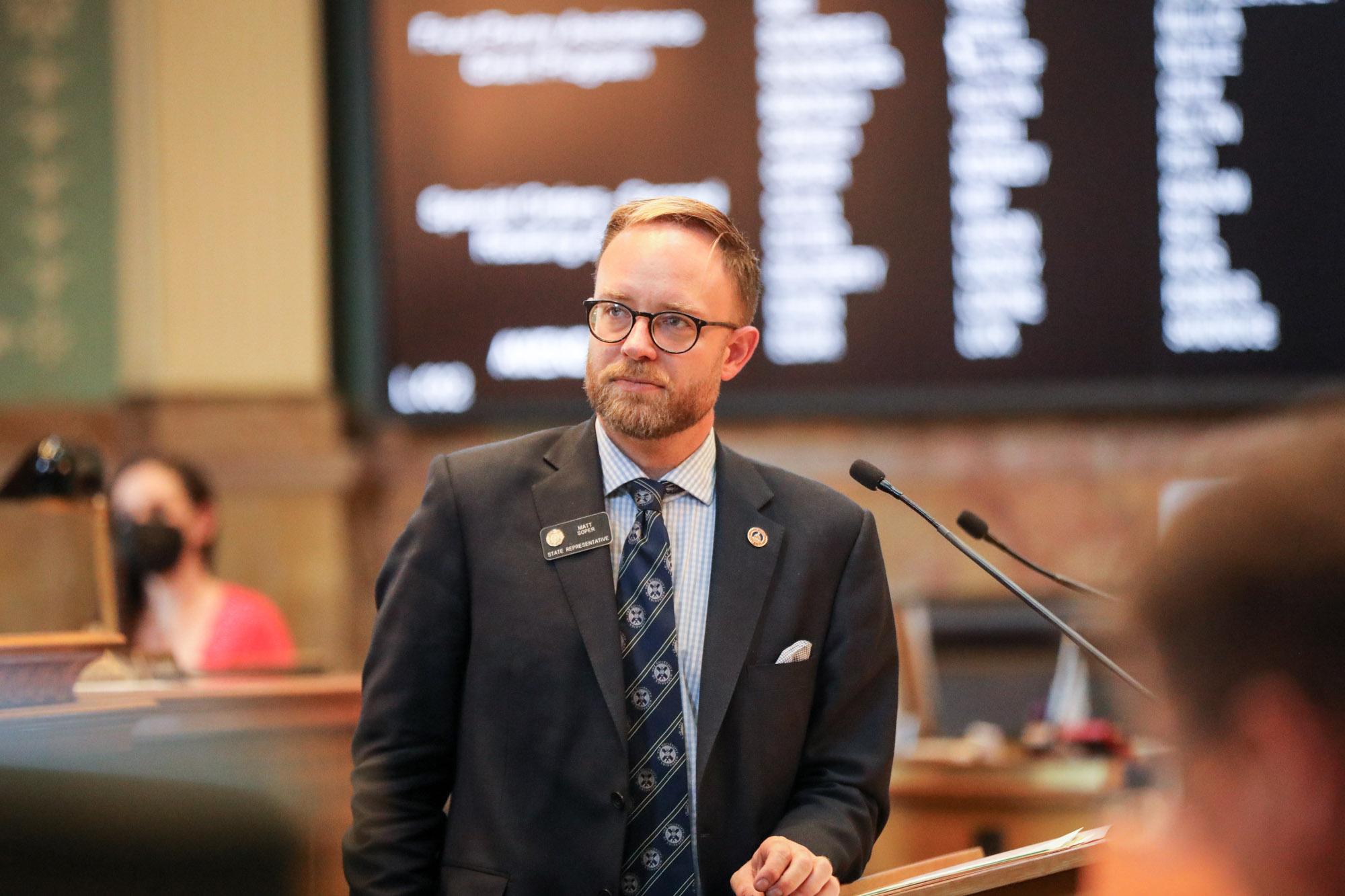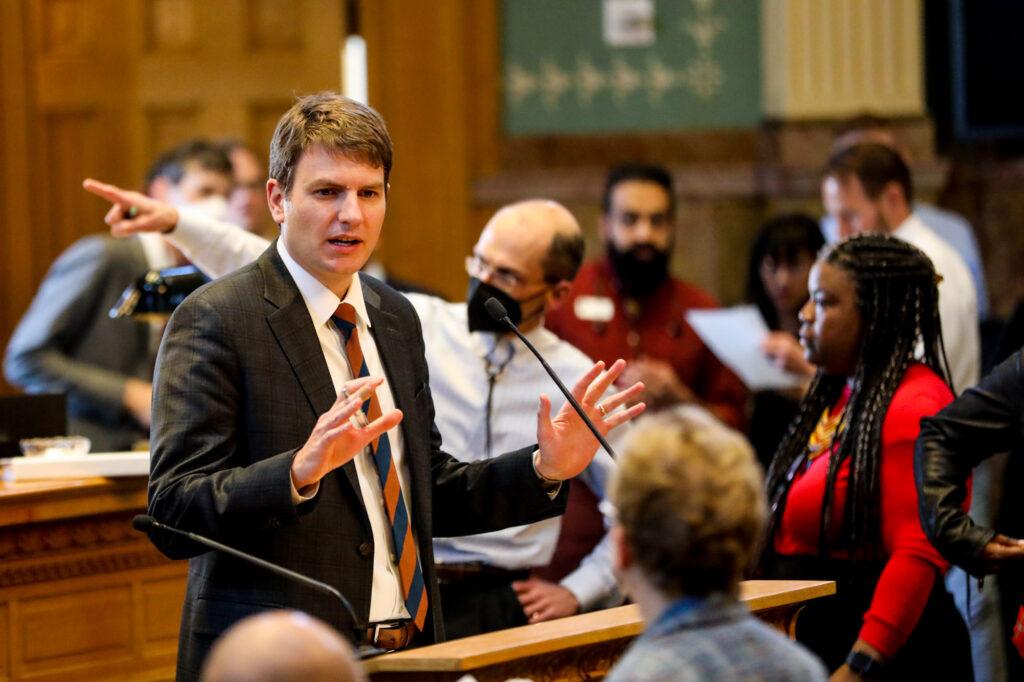
UPDATE 11:51am, May 10, 2022: After working through the night, House Republicans have continued to ask for bills to be read at length on Tuesday morning, although there are signs they might be willing to ease up on their stalling tactics. The resolution they were protesting — a Democratic effort to try to ban the procedural technique Republicans have been using for delays — has run out of time and can no longer move forward. Democrats also agreed to amend an election security bill by removing a provision Republicans objected to requiring county clerks to go through training on misinformation and disinformation.
Another element that has complicated scheduling and negotiations in the final days of session is that House Majority Leader Daneya Esgar, whose job is to run the floor calendar, is working remotely. She told CPR she tested positive for COVID last Friday after first getting symptoms on Thursday.
The original story continues below:
With the hours ticking down toward adjournment and scores of bills still pending at Colorado’s legislature, Republican lawmakers, who are in the minority in both chambers, are trying to run out the clock on some of them.
Lawmakers are required to wrap up their annual session no later than Wednesday at midnight.
In the House, GOP representatives are asking for bills to be read out loud, in their entirety, before they can be considered by the full chamber -- a stalling tactic sanctioned by the state constitution -- as well as speaking at length on many measures, in a sort of ongoing filibuster. They hope to leave Democrats with little time to pass some of the more controversial bills that remain in play.
“It's the one mechanism we have to be able to stomp our feet and to slow things down and object to things we don't like,” said Republican Representative Matt Soper of Delta.
Soper notes that historically bill reading is a tactic that both parties have used to their advantage.
“I've heard stories from years ago when Democrats used it and drove the Republicans nuts. We happen to be using (it now) to annoy the majority party, but it is in our constitution. It's leverage for the minority. Certainly, it allows us to show our annoyance at times.”
But late in the legislative session the delay tactic is more than an annoyance. It can result in the defeat of bills that may have enough votes to pass, but not enough time to get through the process.
By working through the night Monday, Democrats were able to pass some of the bills that have Republicans concerned, including an election security bill aimed at preventing insider threats, and several climate bills focused on air pollution. But while Democratic leaders have said they aren’t worried about getting all of their major priorities across the finish line, some of their colleagues aren’t so sure.

“I think about collective bargaining, I think about the fentanyl (bill), thinking about some of the bigger bills that have dollars tied to them that need to get out, but are more than four pages long, you know?” said Democratic Rep. Jennifer Bacon, noting that how long a bill takes to pass right now has a lot to do with how many words are in it. “I wouldn't be surprised if we'd have to prioritize, in my opinion.”
Soper estimated that all the remaining bills added up could take around one thousand hours to read out loud — far longer than the time remaining in session. Colorado’s supreme court has ruled that bills must be read at a legible speed.
As one example, late Monday night, Republicans requested that a 40-page bipartisan bill to regulate dental hygienists be read at length. It had already overwhelmingly cleared the Senate.
Democratic Rep. Chris Kennedy denounced these types of maneuvers.
“If folks have something that they want to say, they should have every opportunity to say it within the rules of this chamber,” he said. “Having a bill read at length is an obstruction tactic pure and simple. Now that bills are printed online, it provides no actual value to the members here. This is a relic of a bygone era.”
In fact Democrats are considering a measure that might do away with the tactic altogether: a ballot referendum to ask voters to remove the constitutional provision that requires the legislature to honor all requests for a bill to be read out loud.
HCR22-1002 from Rep. Mike Weissman was introduced early in the session, but languished until leaders scheduled it for a hearing Monday in the House State, Civil, Military & Veterans Affairs Committee. Republican anger over the resolution is part of what triggered the deluge of bill reading requests on Monday.
“We're shutting everything down today because of the Weissman resolution and it really is because it flies in the face of what it's like to be in the minority,” said Soper. “I mean, being in the minority, it's already tough.”
The concurrent resolution would need the support of every House Democrat and three Republicans to clear that chamber, a heavy lift.
“Today is one of those days that I would support that,” said Rep. Bacon. She sits on the State Affairs committee and said she would back sending the question to voters.
Editor's Note: This story has been updated to reflect that the House passed the election security bill and several air quality bills Monday night.








